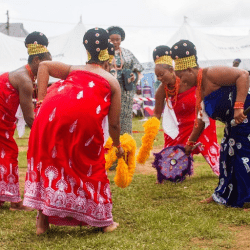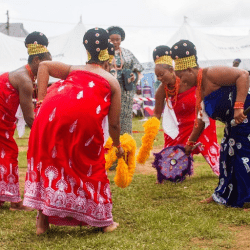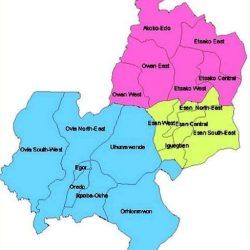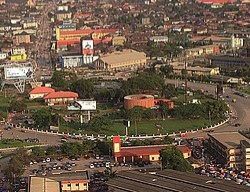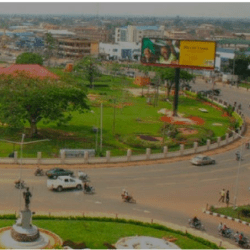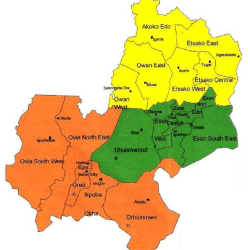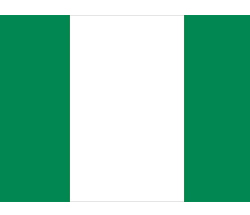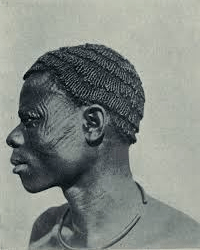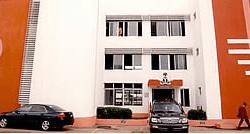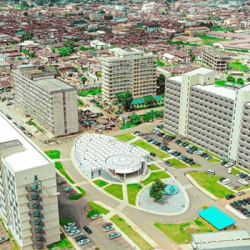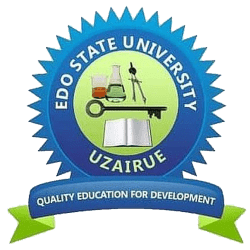Edo state is made up of three major ethnic groups; namely: Binis, Esan and Afemai. Several major ethnic groups in Edo State: Edos, Afemais, Esans, Owans and Akoko Edos trace their origin to Benin City hence the dialects of the groups vary with their distance from Benin City.
Bini people who have 7 out of the 18 Local Government Areas of Edo state and constitute 57.54% while others Esan (17.14%) Afemai comprising of Etsako (12.19%), Owan (7.43%), and Akoko Edo (5.70%).
The Igala-speaking communities exist in Esan South East, Igbira related communities in Akoko and Afemai Areas as well as Urhobos, Izons, Itsekiris and Yoruba communities in Ovia North East and South West Local Government Areas especially in the borderlands.

However the State has a high presence of residents from across the country and the world because of its cosmopolitan tendencies. Benin City the capital has a history of being one of the foremost destinations of Europeans during their exploration of Africa continent many centuries ago. Some of the flash points have remained enviable tourists’ attraction for the state.

The main ethnic groups in Edo State are: Edos, Afemais, Esans, Owans and Akoko Edos. Virtually all the groups traced their origin to Benin City hence the dialects of the groups vary with their distance from Benin City. The Bini speaking people who occupy seven out of the 18 Local Government Areas of the state constitute 57.54% while others Esan (17.14%) Afemai compirising of Etsako (12.19%), Owan (7.43%), and Akoko Edo (5.70%). However, the Igala-speaking communities exist in Esan SOuth East, Igbira related communities in Akoko and Afemai Areas as well as Urhobos, Izons, Itsekiris and Yoruba communities in Ovia North East and South West Local Government Areas especially in the borderlands.

A lot of communities and indeed the ruling dynasties in all the clans trace their roots to the ancient kingdom of Benin. Cultural similarities are in the areas of religious worships, folk-lore, dances, festivals, traditional modes of dressing, arts and craft. The political pattern and behaviour are based on a situation where both the monarchial and republican ideas flourished in an integrated manner. The colourful traditional festivals in the state manifest its rich cultural heritage. Critical among these are the Igue and Ihi Ebo festivals. With an estimated population of 3,218, 332 made up of 1,640,461 males and 1, 577, 871 females and a growth rate of 2.7% per annum (NPC, 2006), as well as a total landmass of 19,187 square kilometers, the state has a population density of about 168 persons per square kilometers.
From the earliest times of civilization, specialized professional guilds or societies were set up to promote the highest ideals in the various arts. These guilds were accorded royal patronage. To this day, some of these guilds, like those of wood carvers and bronze casters, are still operating at Igbesanmwan and Igun streets in Benin City.
Art, as a form of communication, has been greatly explored, especially for recording memorable events in the life of the various communities. Effigies of Obas, heroes and heroines were molded for posterity. Different media such as bronze, brass, mud (terracotta), ebony wood and ivory feature in these works of art. In the 13th century, Igueha introduced brass casting into Benin City. The indigenous artists in Benin have since evolved a peculiar house style in brass casting and created the largest brass industry in the African continent.
The Benin bronze works are the most favored and renowned art works of Edo State. Many of these artworks were looted by the British forces during the invasion of Benin Kingdom in 1897.
In recent years, the Oba of Benin, Omo N’Oba Erediauwa has spear-headed renewed efforts to repatriate these valuable art pieces from Europe. The Idia ivory mask, which was the official symbol of the Second World Black and African Festival of Arts and Culture (FESTAC), is still lying captive in a British museum.
Edo State has produced some of the best crop of outstanding contemporary artists in Nigeria. Some of these renowned artists are Sir Victor Uwaifo (who is a multi media artist), Festus Idehen, Dr. Colette Omogbai-Onyeka, Tayo Aiyegbusi, Osagie Erese, Klem Emoda, Roseline Thomas-Osakwue, Cliff Oguigo, High Priest Osemwingie Ebohon, late Felix Idubor and late Professor Solomon Irein-Wangboje, who in their life times and even now, stand proud as some of the world’s best.
Formal art education is taught at the school of Art and Design, Auchi Polytechnic, Auchi and the Department of Fine and Applied Arts of the University of Benin.
Art galleries are mainly located in the state capital, Benin City, especially on the Airport and Mission Roads axis. The bigger and popular ones like Idubor Art Gallery on Sakponba Road, Victor Uwaifo Gallery along Ekenwan Road, Wangboje Creative Arts Centre on Owoseni Street and Ebohon Cultural Centre off Dumez Road all in Benin City attract tourists and art buffs all year round. Other arts and craft shops are found in the major towns of Edo State.
In the literary arts, the banner of Edo State has continued to be hoisted on the national and international fora. Dr. Festus Iyayi won the Commonwealth Prose Prize in 1989, while Funsho Aiyegina won the Poetry Prize of the Association of Nigerian Authors (ANA) with his poetry collection “A Letter to Lydia and other Poems”.
Frank Aig-Imoukhuede, a former Federal Director of Culture, is the pathfinder in the virgin area of Pidgin English poetry. Odia Ofeimun, a past President of ANA, Harry Garuba, Mabel Segun and Helen Ovbiagele are authors of note in the poetry and prose genres.
In the performing arts, drama groups are mostly located in Benin City with the Edo Cultural Group, Uyi Edo Theatre Group, Earth Pot Cultural Group, Ova Theatre Group, Inneh Troupe, and Ebohon Cultural Troupe featuring prominently.
The State Arts Council has performing troupes that have represented the state at many national and international events. The Oba Akenzua II Cultural Centre, Benin City is the hub of cultural activities in the state, a fine architectural masterpiece with beautiful murals of Edo traditional motifs. The Centre is complemented by Urhokpota Hall which is close by on Ring Road. These two theatres have hosted performances, symposia and exhibitions.
Pottery, basket making, cane furniture, cloth-weaving, mat-making and gold-smithing trades thrive in Edo State with quality and standards comparing favorably with others anywhere in the world.
A craft shop, with wares such as carving, hand-woven clothes, ebony rings, bowls, ash-trays, flower pots and bronze objects, were opened by the state government in July 1968 in Benin City.
The art of basket-making is popular among the Esan ethnic stock. The ready availability of palm fronds has engendered the prevalence of practitioners in this trade in the five local government areas that are Esan-speaking. Their products, which are veritable works of art, include shopping baskets, waste paper baskets and farmer’s wicker baskets.
The Uneme-Nekhua and the South Uneme people in Akoko-Edo and Etsako West Local Government Areas are renowned for their dexterity and skills in traditional black smithing and ceremonial swords. Gold and silver smiths are found in all the major towns in the state. They specialize in the fabrication of ornamental adornments like trinkets, bracelets, bangles, chains and earrings favored by fashion-conscious men and women.
Somorika, Auchi, Igarra and Ubiaja take pre-eminence as major areas of traditional cloth-weaving. The colorful, artistic motifs of the Igarra people have won national and international acclaim.
Molded statues, statuettes and figurines of Olokun the goddess of the sea, is a major feature of the traditional worship in the core Bini council areas of Oredo, Orhionmwon, Uhunmwode, Egor, Ikpoba Okha, Ovia North East and Ovia South west.
Pottery making is largely done by the womenfolk who specialize in the production of the earthenware like cooking pots, bowls, mugs, water pots, pipes etc.
Ojah in Akoko-Edo Local Government Area is known nationally for its fine pottery. Other trailblazers in the art of traditional pottery are the people of Udo in Esan South East Local Government Area, Uhonmora in Owan West Local Government Area, Okpekpe and Imiegba in Etsako East Local Government Area.
Edo
Edo is a state in southern Nigeria that was created in 1991 from the former Bendel State
The capital and largest city of Edo State is Benin City, which was the center of the ancient Benin Empire
The state has a population of about 4.8 million people as of 2022, and covers an area of 19,559 square kilometers

Edo state is bordered by Kogi, Anambra, Delta and Ondo states, and has a coastline on the Atlantic Ocean
The state is home to various ethnic groups, mainly the Edo (or Bini), Esan, Ora, Akoko-Edo, Owan and Afemai people
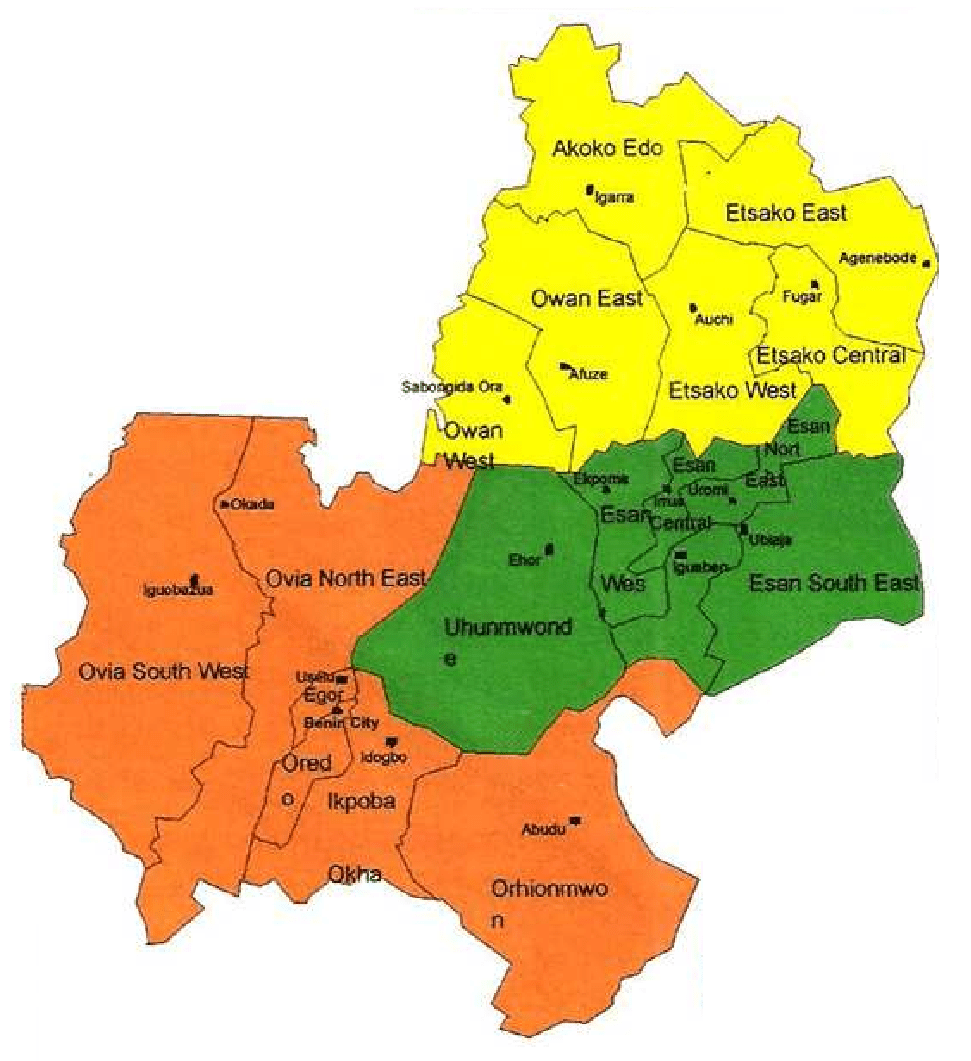
The most common language spoken in the state is Edo, which belongs to the Edoid branch of the Niger-Congo language family
The state is predominantly Christian, but also has followers of Islam and traditional religions
Edo is known as the Heartbeat of Nigeria, and has a rich cultural heritage and history
It has a diverse economy, with sectors such as agriculture, manufacturing, oil and gas, tourism, education and health
Edo people
With Benin City as capital, the population of the entire state is approximately 4million.It is made up of three major ethnic groups; namely the Binis, Esan and Afemai. However the State has a high presence of residents from across the country and the world because of its cosmopolitan tendencies. Benin City the capital has a history of being one of the foremost destinations of Europeans during their exploration of Africa continent many centuries ago. Some of the flash points have remained enviable tourists’ attraction for the state.


Geography
The State has a land mass of 19,794 km square. Lying on 05 44 N and 07 34 N latitudes,05 4 E and 06 45 E longitudes. Edo State is low lying except towards the north axis where the Northern and Esan plateaus range from 183 metres of the Kukuruku Hills and 672 metres of the Somorika Hills.
Location
It is so located that it forms the nucleus of the Niger Delta region. It is bordered by Kogi state to the North and Delta State to the East and South, Ekiti and Ondo States to the West.
Climate
The climate is typically tropical with two major seasons- the wet (Rainy) and the dry (harmattan) seasons. The wet season lasts from April to November and the Dry Season December to March.
Government
The governor of the state, at every time is the head of government. There is the Executive arm of government, the Legislature and the Judiciary. The state has eighteen local government councils each constitutionally headed by a democratically elected Chairman.
Vegetation
Edo is blessed with two major vegetational belts namely: the Forest Belt of the South and Central parts while the Guinea Savannah is in the northern part.
Minerals
Natural resources in Edo State are in abundance. There is a heavy reserve of hard wood and high quality timber. Other mineral endowments include: Rubber, Limestone, Marble, Lignite, Clay, Kaolin, Crude Oil, Gold, Granite and Bitumen.
Agriculture
Apart from the wood products, there is high yield of Agricultural food crops, Cocoa,
Rubber, Palm trees, Vegetables, Cotton, Pineapple, Mango, Cashew, Cassava, Bushmeat, Snails, Fish and Rice.
Industries
The thriving industries are Carving, Saw-milling, Rubber processing, Cement and Textile, Brewing and Flour milling etc. The state also boast of key industries in the country such as Bendel Cement Factory Okpella, Bendel Brewery Benin City, Guinness Nigeria Benin-City, Nigeria Bottling Company (Coca-Cola) Benin City, Ewu Flour Mill Ewu and Bendel Pharmaceutical Benin-City, Okomu oil Plc , Presco Plc just to name a few. The Small-Scale industries are also on the increase with many Banks and Fast Food Eateries opening up their outlets in the capital and other emerging cities across the state.
Education
Edo State is one of the most educationally advanced States in Nigeria. Its notable tertiary institutions include the University of Benin, Ambrose Alli University Ekpoma, Igbinedion University Okada, Benson Idahosa University, Auchi Polytechnic Auchi, College of Education Ekiadolor, College of Agriculture Iguoriakhi and Institute of Management and Technology Usen.
Healthcare
Government in conjunction with local governments and some international agencies have successfully spread Medicare across the state. There are government hospitals, local government centres by local authorities and quite a few others jointly managed with some non governmental agencies.
Seaports
From Edo State, there is easy access to Warri seaports. The state also has a direct route to Lagos from land and air. Edo is known as the heartbeat of the country because of its easy accessibility from various Southern cities like Lagos, Warri, Port Harcourt and the Eastern states.
Arts and culture
Edo is famous for her works of art, they include plaques, busts and royal figures. Some of these art works were looted during the British invasion of the Benin Empire in 1897. Various pottery, utility carving, bronze casting, smothering, Jewelry, mat-making, cloth weaving etc thrive in the state.
